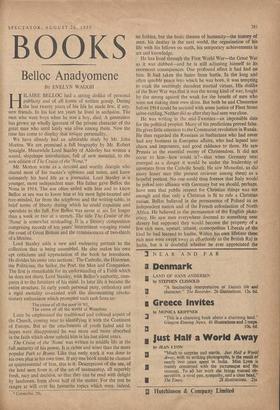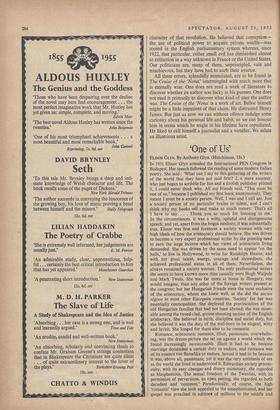BOOKS
Belloc Anadyomene
By EVELYN WAUGH H' ILAIRE BELLOC had a strong dislike of personal publicity and of all forms of written gossip. During the last twenty years, of his life he made few, if any. new friends. In his last ten 'years he lived in seclusion. The men who were boys when he was a boy, died. A generation has grown up wholly ignorant of the private character of the great man who until lately was alive among them. Now the time has come to display that unique personality.
We have already had an admirable study by Mr. John Morton. We are promised a full biography by Air. Robert Speaight. Meanwhile Lord Stanley of Alderley has written a sound, shipshape introduction, full of new material, to the new edition of The Cruise of the 'Nona."' Mr. Morton wrote as a devoted and worthy disciple who shared most of his master's opinions and tastes, and knew intimately his hard life as a journalist. Lord Stanley is a younger, more independent man. His father gave Belloc the Nona in 1914. The son often sailed with him and to know Belloc at sea was to know him at his most light-hearted and free-minded, far from the telephone and the writing-table, in brief terms of liberty during which he could expatiate and speculate to the full. For Belloc was never at sea for longer than a week or two at a stretch. The title The Cruise of the 'Nona' is somewhat misleading. It is a literary composition comprising records of ten years' intermittent voyaging round the coast of Great Britain and the reminiscences of two-thirds of a lifetime.
Lord Stanley adds a new and endearing portrait to the collection that is being assembled. He also makes his own apt criticisms and appreciation of the book he introduces. He divides his essay into sections: The Catholic, the Historian. the Politician, the Sailor, the Poet, the Man and Companion. The first is remarkable for its understanding of a Faith which he does not share. Lord Stanley, with Belloc's authority, com- pares it to the furniture of his mind. In later life it became the entire structure. In early youth personal piety, orthodoxy and a rigid morality co-existed with the disconcerting revolu- tionary enthusiasm which prompted such rash lines as: The cause of all the poor in '93, The cause of all the world at Waterloo.
Later he ethphasised the traditional and cultural aspect of the Church, coming near to identifying it with the Continent of Europe. But as the attachments of youth faded and its hopes were disappointed he was more and more absorbed in the faith which alone upheld him in his last silent years.
The Cruise of the 'Nona' was written in middle life at the full.maturity of his power. It is richer and wiser than the more popular Path to Rome. Like that early work it was done to his own plan in his own time. If any one book could be claimed as quintessential of him, this is it. Descriptions of the sea, of the land seen from it, of the art of seamanship, all superbly fresh, racy and decisive, so that they can be read with delight by landsmen, form about half of the matter. For the rest he ranges at will over his faVourite topics which were, indeed.
* Constable, 20s.
no foibles, but the basic themes of humanity—the history of man, his destiny in the next world, the organisation 'of his life with his fellows on earth, his temporary achievements in art and knowledge.
He has lived through the First World War—the Great War as it was dubbed—and he is still adjusting himself to its enormous consequences. One profound effect it had had on him. It had taken the lustre from battle. In the long and often ignoble peace into which he was born, it was tempting to exalt the seemingly decadent martial virtues. His dislike of the Boer War was that it was the wrong kind of war, fought by the strong against the weak for the benefit of men who were not risking their own skins. But both he and Chesterton before 1914 could be accused with some justice of Fleet Street sabre-rattling. Neither did so after they had seen war close.
He was writing in the mid-Twenties—an impossible date for the political prophet. Many pf his predictions proved false. He gives little attention to the Communist revolution in Russia. He then regarded the Russians as barbarians who had never had any business in European affairs, who had lapsed into chaos and impotence, and good riddance to them. He saw Prussia as the essential enemy of Christendom. It did not occur to him—how could it?—that when Germany next emerged as a danger it would be under the leadership of apostates from the Catholic South. He saw Mussolini, as did many lesser men (the present reviewer among them) as a hopeful portent. No one could then foresee that Italy would be jerked into alliance with Germany but we should, perhaps, have seen that public respect for Christian things was not enough and that only a Christian is fit to rule a Christian nation. Belloc believed in the permanence of Poland as an independent nation and of the French colonisation of North Africa. He believed in the permanence of the English pluto- cracy. He saw men everywhere doomed to something near slavery but supposed they would become the property of a few rich men, upstart, atheist. cosmopolitan Liberals of the kind he had learned to loathe. Within his own lifetime these rich men were swept away as effortlessly as the British Raj in India, but it is doubtful whether he ever appreciated the character of that revolution. He believed that corruption— the use of political power to acquire private wealth—was rooted in the English parliamentary system whereas, since 1922, that particular, rather small evil has diminished almost to extinction in a way unknown in France or the United States. Our politicians are, many of them, unprincipled, vain and mischievous, but they have had to curb their avarice.
All these errors, splendidly enunciated, are to be found in The Cruise of the 'Nona,' intermingled with much more that is eternally wise. One does not read a work of literature to discover whether its author was lucky in his guesses. One does not read it primarily to discover what kind of man the author was. The Cruise of the 'Nona' is a work of art. Belloc himself might be a little impatient of that claim. He distrusted Henry James. But just as now we can without offence indulge some curiosity about his personal life and habit, so we can honour him in terms which he might in his lifetime have repudiated. He liked to call himself a journalist and a versifier. We salute an illustrious artist.



































 Previous page
Previous page